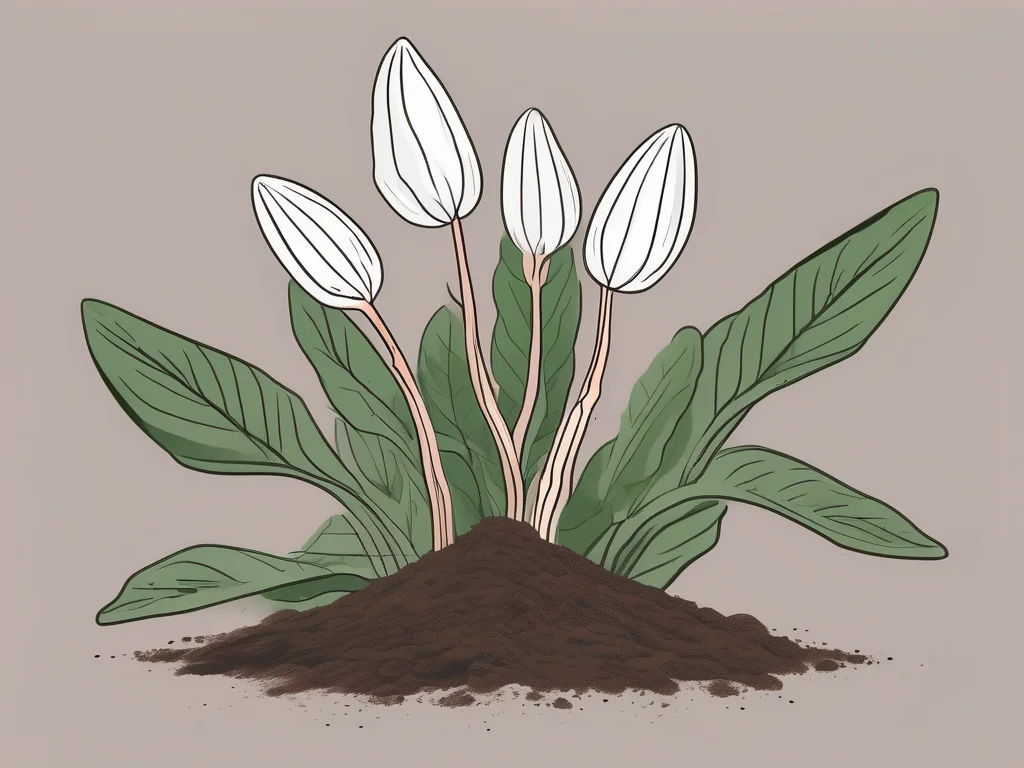Arrowroot powder, often considered a “superfood,” has been used for centuries in various cultures for its amazing health benefits. This versatile powder is derived from the root of the arrowroot plant (Maranta arundinacea), and its use spans from culinary applications to natural remedies for skin and digestion. Whether you’re looking to boost your health or improve your recipes, learning how to use arrowroot powder can be an excellent addition to your wellness routine.
In this blog post, we will explore the numerous health benefits of arrowroot powder, how to incorporate it into your diet, and its versatile uses in skincare. By the end of this guide, you will have a thorough understanding of why arrowroot powder deserves a place in your kitchen and bathroom.
What is Arrowroot Powder?
Arrowroot powder is a white, fine starch powder obtained from the rhizomes (roots) of the arrowroot plant, which is native to tropical regions of the Americas and Asia. The plant’s rhizomes are harvested, cleaned, and processed to produce a fine, odorless powder. Arrowroot powder has been used in traditional medicine for centuries due to its numerous health benefits.
Nutritional Value of Arrowroot Powder
Arrowroot powder is a low-calorie, gluten-free starch that can be used as a thickening agent in cooking. While it is not packed with vitamins and minerals, it does provide essential nutrients like:
- Carbohydrates: Arrowroot powder is primarily made up of carbohydrates, which provide quick energy.
- Fiber: It contains some fiber, which aids in digestion.
- B Vitamins: It provides small amounts of B vitamins, such as folate, that support metabolic functions.
- Potassium: Arrowroot is a good source of potassium, a mineral that helps regulate fluid balance and support heart health.
Although arrowroot powder is not as nutrient-dense as other superfoods, its health benefits come from its digestibility and natural properties.
Health Benefits of Arrowroot Powder
Arrowroot powder is known for its numerous health benefits, from promoting digestive health to supporting skin health. Let’s break down how this natural ingredient can help improve your overall well-being.
1. Promotes Digestive Health
One of the key health benefits of arrowroot powder is its ability to support digestion. Arrowroot is considered a gentle food for the digestive system, making it particularly beneficial for individuals suffering from stomach discomfort or digestive issues.
How it helps:
- Soothes the Digestive Tract: Arrowroot powder has a mild, soothing effect on the stomach and intestines. It can help relieve symptoms of diarrhea, nausea, and upset stomach.
- Eases Constipation: The fiber content in arrowroot helps move food through the digestive system, promoting regular bowel movements and alleviating constipation.
Arrowroot powder is often recommended as part of the BRAT diet (bananas, rice, applesauce, and toast) during recovery from gastrointestinal issues because it is easy to digest and gentle on the stomach.
2. Gluten-Free Alternative
Arrowroot powder is a gluten-free starch, making it an excellent alternative to wheat flour or cornstarch for people with gluten sensitivities or celiac disease. It can be used in various recipes as a thickener for soups, sauces, and puddings or as a binding agent in baked goods.
How it helps:
- Bakes Like Wheat Flour: Arrowroot powder can be used in place of wheat flour or cornstarch in recipes. It creates a smooth, glossy texture without the risk of gluten contamination.
- Supports Gluten-Free Diets: For those with gluten intolerance, arrowroot powder is a healthy, natural substitute in recipes like gluten-free cookies, cakes, and bread.
3. Boosts Immune System
Arrowroot powder contains trace amounts of vitamin C and antioxidants, which can help boost your immune system. While not as concentrated as other sources, regular consumption of arrowroot can contribute to better overall immune health.
How it helps:
- Supports Immune Function: The antioxidants and vitamin C in arrowroot powder help strengthen the immune system, protect against oxidative stress, and improve the body’s ability to fight infections.
4. Aids in Weight Loss
For individuals looking to lose weight, arrowroot powder can be a helpful addition to your diet. Its high fiber content helps keep you feeling full, which can prevent overeating and support weight loss efforts.
How it helps:
- Suppresses Appetite: The fiber in arrowroot powder helps you feel fuller for longer, which can reduce overall calorie intake and help with weight management.
- Low-Calorie: Arrowroot powder is low in calories, making it a great option for adding texture to dishes without adding excess calories.
5. Supports Skin Health
Arrowroot powder is widely used in skincare due to its soothing and healing properties. It is commonly found in natural body powders, baby powders, and homemade skincare products. The powder helps absorb moisture and reduce skin irritation.
How it helps:
- Soothes Skin: Arrowroot powder can be applied topically to soothe irritated or inflamed skin. It is often used in natural remedies for rashes, diaper rash, and sunburn.
- Absorbs Excess Oil: Arrowroot powder helps absorb excess oil on the skin, making it a great ingredient for oily or acne-prone skin.
- Acts as a Natural Dry Shampoo: Arrowroot powder is often used in homemade dry shampoos as it absorbs oil and refreshes hair without leaving a greasy residue.
How to Use Arrowroot Powder in Your Diet
Arrowroot powder is incredibly versatile and can be incorporated into your diet in a variety of ways. Whether you’re using it as a thickening agent in your cooking or as a base for smoothies, there are plenty of ways to add this nutrient-dense powder to your meals.
1. Arrowroot Powder as a Thickener
One of the most common uses of arrowroot powder is as a thickening agent. It can be used to thicken soups, sauces, gravies, and puddings.
How to Use:
- Mix 1 tablespoon of arrowroot powder with 2 tablespoons of cold water to make a slurry.
- Add the slurry to your hot liquid, stirring constantly to avoid lumps. Cook for 1-2 minutes until the liquid thickens.
Arrowroot powder is especially useful when making gluten-free dishes, as it doesn’t change the flavor or texture of the food.
2. Arrowroot Powder in Smoothies
Arrowroot powder can be added to smoothies to increase the fiber content and improve the texture. It can help make your smoothies thicker and creamier without adding any dairy or gluten.
How to Use:
- Add 1 teaspoon of arrowroot powder to your smoothie mix and blend well.
It’s best to add arrowroot powder to smoothies with fruits and vegetables that are easy to blend, such as bananas, berries, and spinach.
3. Arrowroot Powder in Gluten-Free Baking
Arrowroot powder is a popular ingredient in gluten-free baking. It can be used to replace wheat flour in various baked goods like cookies, cakes, and muffins.
How to Use:
- Substitute arrowroot powder for up to 25% of the total flour in a gluten-free recipe.
- Combine it with other gluten-free flours, such as rice flour or almond flour, to improve texture and moisture.
4. Arrowroot Powder for Baby Food
Arrowroot powder is often used in homemade baby food because it is easy to digest and gentle on the stomach. It can be added to pureed fruits or vegetables to create a smooth, thick consistency.
How to Use:
- Mix arrowroot powder with water or fruit juice and cook to form a smooth paste.
- Add to pureed fruits or vegetables for an easy-to-eat texture.
How to Use Arrowroot Powder in Skincare
Arrowroot powder is also a great natural ingredient for your skincare routine. It can be used to make DIY skincare products such as body powders, face masks, and lotions.
1. Homemade Face Powder
Arrowroot powder is often used as a base in homemade face powders because it absorbs oil and helps keep your skin matte.
How to Use:
- Combine 2 tablespoons of arrowroot powder with 1 tablespoon of cocoa powder (for darker skin tones) or cornstarch (for lighter skin tones).
- Apply to your face with a makeup brush for a natural, oil-absorbing finish.
2. Arrowroot Powder for Soothing Rashes
Arrowroot powder can be applied topically to soothe rashes, diaper rash, or skin irritation. Its mild, anti-inflammatory properties make it a great natural remedy for irritated skin.
How to Use:
- Sprinkle arrowroot powder directly onto the affected area and gently rub it in.
- Repeat 2-3 times a day for relief.
Real-Life Scenario
Riya, a 30-year-old fitness enthusiast, started using arrowroot powder in her smoothies after workouts. She noticed better digestion and fewer stomach cramps. When her child had mild diarrhea, she gave him a small amount mixed in water — it worked gently and effectively. This shows how arrowroot can be used for both adults and children as a safe, natural remedy.
Expert Contribution
According to nutrition experts, arrowroot powder is an easily digestible starch that’s ideal for people with dietary restrictions or sensitive stomachs. It’s naturally gluten-free, making it suitable for those with celiac disease. Dietitians often recommend arrowroot for its anti-inflammatory properties and ability to support healthy gut bacteria.
Some studies also suggest that arrowroot may help improve immune response and support wound healing when used topically.
Recommendations Grounded in Proven Research and Facts
- For digestion: Mix 1 teaspoon of arrowroot powder in a cup of warm water once a day.
- For skincare: Use a paste of arrowroot powder and aloe vera gel for rashes or acne-prone skin.
- For cooking: Replace cornstarch with arrowroot powder in a 1:1 ratio for a healthier, gluten-free alternative.
- For hydration: Combine arrowroot powder with lemon juice and honey in water for a natural electrolyte drink.
- Use in moderation: Although safe, excessive use may cause constipation due to its starch content.
Research-backed studies show that arrowroot’s resistant starch supports gut health, promotes fullness, and helps manage blood sugar levels naturally.
Frequently Asked Questions (FAQs)
1. Is Arrowroot Powder Good for Weight Loss?
Yes, arrowroot powder is low in calories and high in fiber, which can help reduce appetite and promote a feeling of fullness, making it a good addition to a weight-loss diet.
2. Can Arrowroot Powder Be Used for Diarrhea?
Yes, arrowroot powder is gentle on the stomach and can help soothe diarrhea. It’s commonly recommended as part of the BRAT diet for digestive issues.
3. Is Arrowroot Powder Safe for Babies?
Arrowroot powder is safe for babies and is often used in homemade baby food. It’s easy to digest and can help thicken pureed foods.
4. How Do You Use Arrowroot Powder for Skincare?
Arrowroot powder can be used in homemade skincare products like face powders, lotions, and body powders. It absorbs moisture, reduces oiliness, and soothes irritated skin.
5. Can Arrowroot Powder Be Used as a Thickener in Gluten-Free Recipes?
Yes, arrowroot powder is a popular gluten-free thickening agent that can be used in soups, sauces, and baked goods. It’s especially useful in gluten-free diets.
Conclusion
Arrowroot powder is a versatile and beneficial ingredient for both your health and beauty routine. From supporting digestion and weight loss to soothing irritated skin, this natural powder offers a wide range of benefits. Whether you’re using it in the kitchen or on your skin, arrowroot powder is a fantastic addition to your daily routine.
By incorporating arrowroot powder into your diet and skincare routine, you can harness its many health benefits and enjoy a more vibrant, healthy lifestyle. Give it a try and see how this simple ingredient can make a big difference in your wellness journey!



